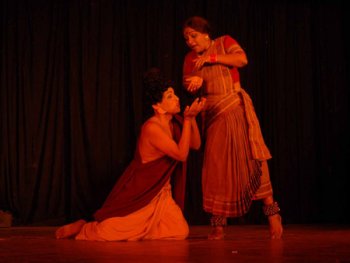
|   |

|   |
Chandalika: Acceptance and rejection - B Venkat, Visakhapatnam e-mail: bhavanvitha@gmail.com Photos courtesy: Kuchipudi Kalaa Kendra September 4, 2011  Gurudev
Rabindranath Tagore’s 150th birthday was celebrated by
RAWA, Renaissance Artists Writers Association, in
Kalabharati, Visakhapatnam, on 7th August 2011. His famous
work ‘Chandalika’ composed by legendary Kuchipudi maestro
Vempati Chinna Satyam was presented by Kuchipudi Kalaa
Kendra. Guru Bala Kondalarao, founder of the institute,
played Chandalika. Her performance on stage after many
years enthralled the audience. Gurudev
Rabindranath Tagore’s 150th birthday was celebrated by
RAWA, Renaissance Artists Writers Association, in
Kalabharati, Visakhapatnam, on 7th August 2011. His famous
work ‘Chandalika’ composed by legendary Kuchipudi maestro
Vempati Chinna Satyam was presented by Kuchipudi Kalaa
Kendra. Guru Bala Kondalarao, founder of the institute,
played Chandalika. Her performance on stage after many
years enthralled the audience. Dance dramas with social messages are not easy to produce, more so as the message passed on relates to a different time. Invocation by Balakka, as Bala Kondala Rao is affectionately called by students, was a dance invocation with presence of Gurudev. Good thinking. The drama unfolded with Chandalika, an innocent girl unaware of her social status (of her times), seeking to offer prayers, wanting to buy items to be offered to God. She faces the cruel reality soon after. The scenes of Chandalika getting rejected by flower vendors, by milkmaids, and finally by the bangle sellers effectively convey harsh reality of rejection to her. Rejection proves to be bitter and the sadness arising out of it was portrayed by engrossing abhinaya of Balakka. As she wipes the curd and milk spilt on her by the vendors, the extent of dejection sinks in, and giving way to anger, Chandalika almost explodes. The array of expressions brought about in the transformation from an innocent girl to that of a rejected fiery woman, are worth mentioning. There appears a thirsty monk (played by Tatarao) in front of her as if by divine intervention. His soothing presence and his plea to Chandalika for water act as acceptance. She forgets her earlier feeling of pain of rejection and turns blissful, joyous, regaining her feeling of self-worth and all this in disbelief. How wonderful was the enactment of Balakka to the contrasting emotions! The lifting of disappointment and the ecstasy were very well portrayed. Only an experienced and an expert can fathom and depict a view into complex human nature. Chandalika, being sensitive and innocent in nature, now desires the monk who by his simple act of acceptance of water offered to him endears himself to her. She takes the help of her mother Maya, whose magical powers and witchcraft unleash evil forces and draw the monk to Chandalika. Maalyada Anand played the role of Maya with intense bhibhatsa - as she concentrates all her skill in bringing the evil forces to act. There were some rigorous jathis and astonishing expressions befitting the skills of Maya in witchcraft. With the tortured monk in front, Chandalika regrets. Seeing the pain she caused the monk, Chandalika feels guilty of sin. She repents for her mistake and now feels rejection, her own rejection of self. What a turn of events! The monk however pacifies her and as a mark of acceptance, once again asks her to fetch some water to satisfy his thirst. He then accepts her as his disciple and she follows him.
Telugu script is by SV Bhujangaraya Sharma, music by Mallik and Sangeetha Rao, choreography by Guru Vempati Chinna Satyam. The orchestra comprised of nattuvangam - Aditya Bulli Brahmam, mridangam - Anand Sri Hari, tabla – Danunjay, vocalists Suryanarayana and Sudha Rani, flute – Rajaram, violin - Satya Vishal, veena – Satyanarayana and keyboard – Satyam. The audience enjoyed the performance and in order to show their appreciation, took over the stage and congratulated Balakka and her team. Other scoring points of the drama were the costumes (that bring Bengal of the times when it was written), the delightful dances and dancers, and the lilting folk song tunes. The audio system however was not up to the mark. |